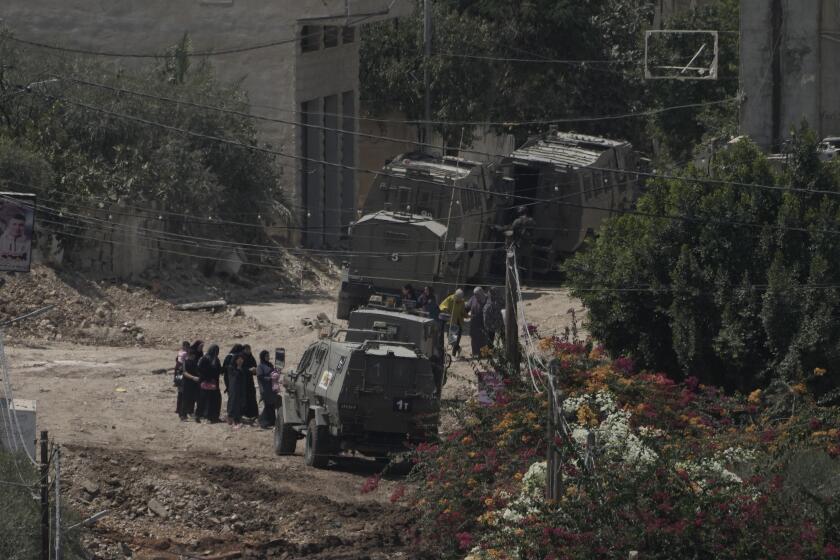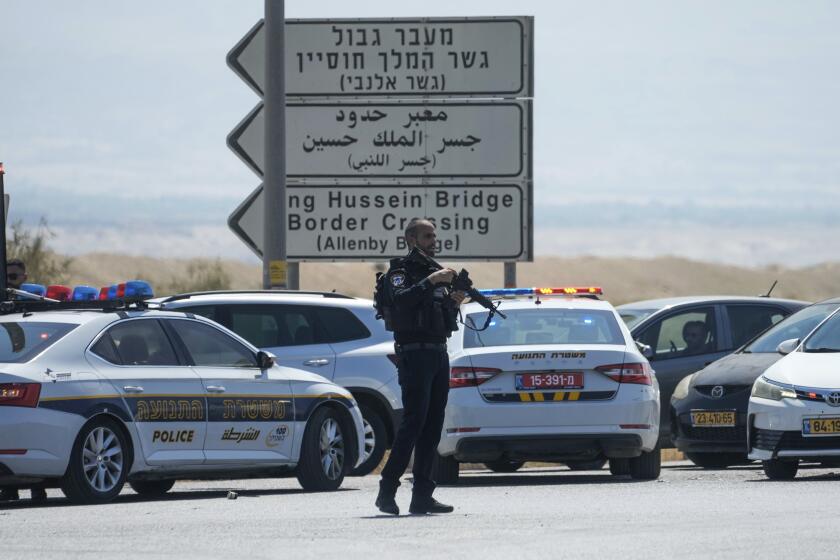The U.N. chief calls the death and destruction in Gaza the worst he’s seen

The U.N. chief said Monday that the United Nations has offered to monitor any cease-fire in Gaza and demanded an end to the worst death and destruction he has seen in his more than seven-year tenure.
Secretary-General Antonio Guterres said in an interview with the Associated Press that it’s “unrealistic” to think the U.N. could play a role in Gaza’s future, either by administering the territory or providing a peacekeeping force, because Israel is unlikely to accept a U.N. role.
But he said “the U.N. will be available to support any cease-fire.” The United Nations has had a military monitoring mission, known as UNTSO, in the Middle East since 1948, and “from our side, this was one of the hypotheses that we’ve put on the table,” he said.
“Of course, we’ll be ready to do whatever the international community asked for us,” Guterres said. “The question is whether the parties would accept it, and in particular whether Israel would accept it.”
Israel’s military assault on Gaza, triggered by Hamas’ attacks in southern Israel on Oct. 7, has stretched for 11 months, with recent cease-fire talks failing to reach a breakthrough and violence in the West Bank reaching new highs.
A push to inoculate Gaza children against polio begins, as Palestinians in the Hamas-governed enclave and occupied West Bank reel from Israeli attacks.
Stressing the urgency of a cease-fire, Guterres said: “The level of suffering we are witnessing in Gaza is unprecedented in my mandate as secretary-general of the United Nations. I’ve never seen such a level of death and destruction as we are seeing in Gaza in the last few months.”
The war has killed over 40,900 Palestinians, according to Gaza’s Health Ministry. The ministry, part of Gaza’s Hamas government, does not differentiate between fighters and civilians in its count, though it says about half of the dead have been women and children. Israel says at least 17,000 militants are among the dead.
The war has caused vast destruction and displaced around 90% of Gaza’s population of 2.3 million people, often multiple times.
Israeli Prime Minister Benjamin Netanyahu and his government have accused the U.N. of being anti-Israel and have been highly critical of U.N. humanitarian operations in Gaza, accusing U.N. workers of collaborating with Hamas. He also has voiced skepticism about peacekeeping missions, saying only Israel can protect itself.
Facing protests at home and increasing urgency from allies, Netanyahu has pushed back against pressure for a cease-fire deal and declared that “no one will preach to me.”
Israel’s U.N. mission spokesperson did not immediately respond to calls or a text message seeking comment.
Looking beyond an agreement, Guterres stressed that a two-state solution to the decades-old Israeli-Palestinian conflict not only is viable but is “the only solution.”
The United States and others support Palestinian statehood in lands captured by Israel in the 1967 Mideast war, but Netanyahu, who is leading the most conservative government in Israel’s history, has opposed calls for a two-state solution.
Guterres asked rhetorically whether the alternative is viable.
“It means that you have 5 million Palestinians living there without any rights in a state,” he said. “Is it possible? Can we accept an idea similar to what we had in South Africa in the past?”
He was referring to South Africa’s apartheid system, under which its minority white population marginalized and segregated people of color, especially Black people, from 1948 until the early 1990s.
“I do not think you can have two peoples living together if they are not in a basis of equality, and if they are not in a basis of respect — mutual respect of their rights,” Guterres said. “So the two-state solution is, in my opinion, a must if we want to have peace in the Middle East.”
The Palestinians have circulated a draft U.N. resolution demanding that Israel end its “unlawful presence” in Gaza and the West Bank within six months. The proposed General Assembly resolution follows a ruling by the top United Nations court in July that said Israel’s presence in the Palestinian territories is unlawful and must end.
In the wide-ranging interview, the U.N. chief painted a grim global picture, saying, “Our world is in total disarray — I would say in total chaos.”
Conflicts are spreading, and the most dramatic ones, such as those in Ukraine and Gaza, have no end in sight, he said. Climate change is having devastating effects and artificial intelligence is developing without serious guardrails.
At the same time, Guterres said, “we see dramatic inequalities” and developing countries struggling, many submerged in debt and without resources to educate their children or provide basic infrastructure.
The secretary-general has invited world leaders to a summit in the days before their annual high-level meeting at the U.N. General Assembly later this month to recommit to working together to meet those challenges and reform multilateral institutions established after World War II, including the U.N.
Guterres said Ukraine’s recent incursion into Russia’s Kursk region shows that the war, now in its third year, will not end quickly or easily.
“The situation in Ukraine is stuck, and I do not see a cease-fire in the immediate future,” he said.
The secretary-general also said U.N. humanitarian operations are in crisis because needs have increased dramatically “with the proliferation of conflicts, proliferation of natural disasters, with climate change moving fast.” But funding has not.
Unfortunately, the priorities of the world’s leaders “do not correspond to the real needs of humankind at the present moment,” he said.
Lederer writes for the Associated Press.
More to Read
Sign up for Essential California
The most important California stories and recommendations in your inbox every morning.
You may occasionally receive promotional content from the Los Angeles Times.







